This is the view from the front steps of our NE Illinois condominium on March 20, 2010. The slowing economy had stalled completion of the 144 town-home living units that were to occupy the entirety of the three block area around our building. My comments at the time are italicized:
Snow on the first day of Spring! The Horned Larks have just started nesting in this field.
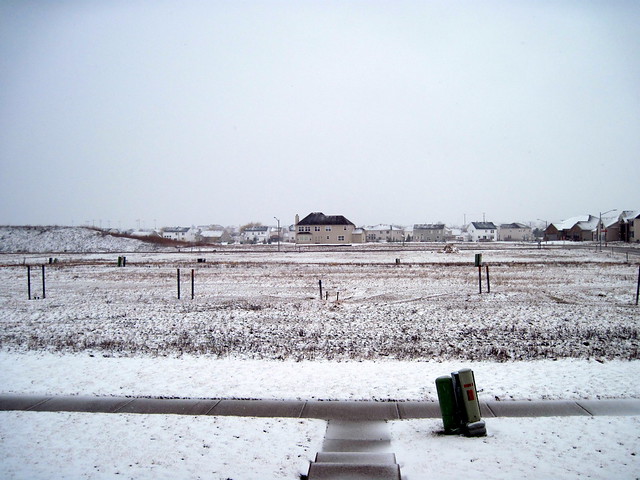
August 20, 2010
Development has been stalled due to the poor housing market, allowing the disturbed land around our condo to return to grass. (The patch of taller grass and shrubs conceals the small pond which contained water much of the year)
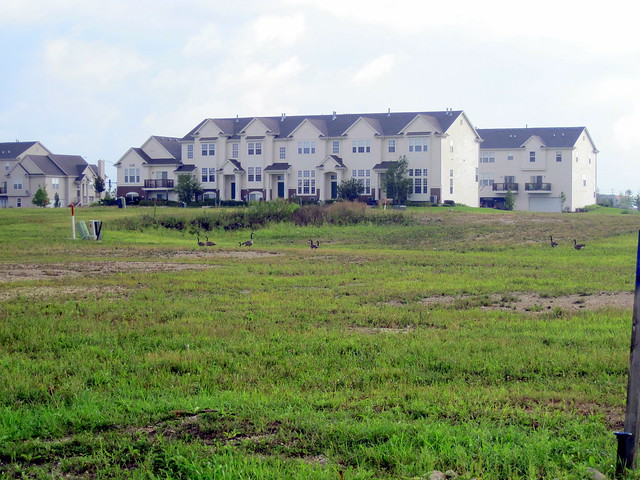
May 8, 2011:
Taken through window pane. I happened to look out the upstairs bedroom window of our condo in North Aurora (Illinois) and saw the white head of a "Blue" morph Snow Goose among the 9 Canada Geese that were foraging in and around a fluddle in the undeveloped lot in front of our home. The Snow Goose tended to associate with one of the Canada geese, and the two spent much of their time apart from the rest of the flock... The far northern edge of the breeding range of Canada geese overlaps with that of the Snow Goose. The latter species is known for "dumping" its eggs in neighboring nests. Is it possible that this Canada Goose raised this particular bird?
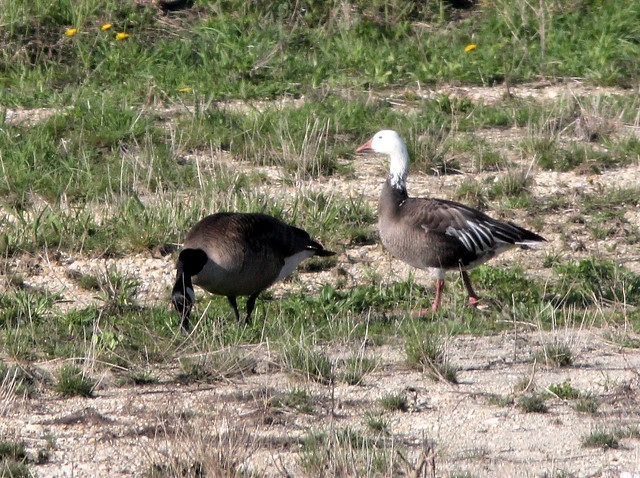
That same day, Canada Geese swam in the small pond in the open space:
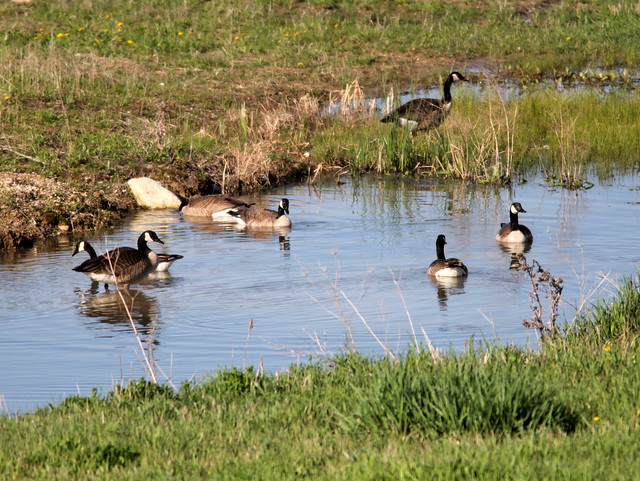
May 22, 2011:
All this week Spotted Sandpipers have been singing in the vacant lot in front of our Illinois condo. Yesterday I saw one atop a pile of rubble near the edge of our street, so I stopped there this morning, using the car as a blind, hoping to photograph them from only about 20 feet... After about 10 minutes a Spotted Sandpiper began moving between rock piles and suddenly was right in front of me.
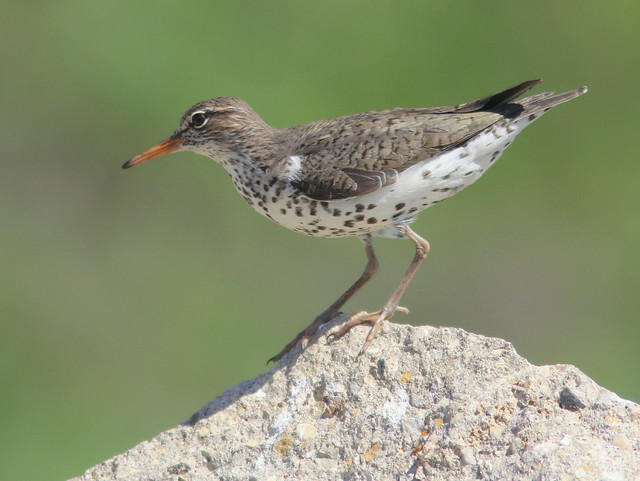
August 3, 2011:
This afternoon, the three Sandhill Cranes that we saw here yesterday returned to the disturbed block surrounding our Illinois condo. Since the builder went bankrupt, this area has gone back to grass and weeds. There is one fairly constant pond in the center, and other "fluddles" that appear and may persist for several weeks when it rains.
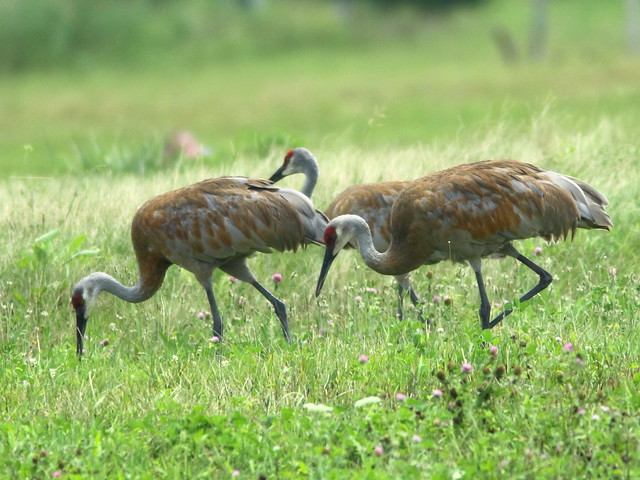
August 21, 2011:
A new yard bird, I saw this Solitary Sandpiper in the vacant lots in front of our Illinois condo this morning, just after driving out on the way to Nelson Lake. It was in a puddle caused by the heavy rainstorm yesterday. Returning home, we found these two of the same species in another puddle right outside our front door...

June 29, 2012:
Views of the shelf clouds that preceded the severe thunderstorms on June 29, 2012, North Aurora, Illinois. The spaces between the cloud layers created white ribbons that stretched 180 degrees across the sky from north to south. Taken from the front door of our condo. (Sadly, we are now hemmed in by 2-story buildings and no longer have a view of the horizon)
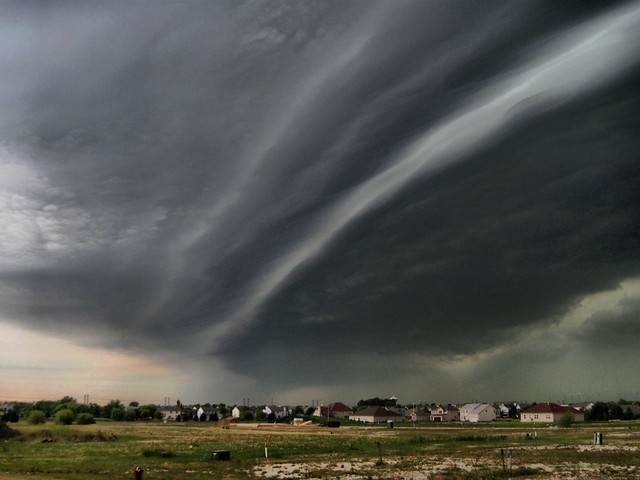
This is the opposite (north) end of that same cloud, which extended between both horizons:

April 21, 2013:
View from our front door steps. Change is inevitable, from the destruction of my quiet "Fake Hammock," (in Florida, as it appeared in 2011 and as seen in 2013) now in full sunlight overgrown with grasses, to the clearing of the prairie in front of our Illinois condo...

May 16, 2013:
This unit, one of 29 new buildings under construction, occupies the open space in front of our condo (taken from our upstairs bedroom window).
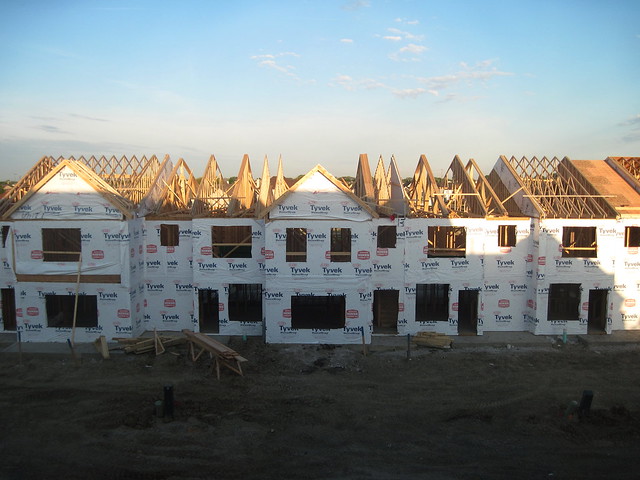
September 13, 2015:
The latest view from our front steps. Construction of the entire 3 city block development has been completed. Although the prairie which surrounded our condo has been completely developed and landscaped, a flock of Canada Geese and three Sandhill Cranes (barely visible in center of this photo at the distant end of the groomed "park" area) still find reason to rest and forage here.
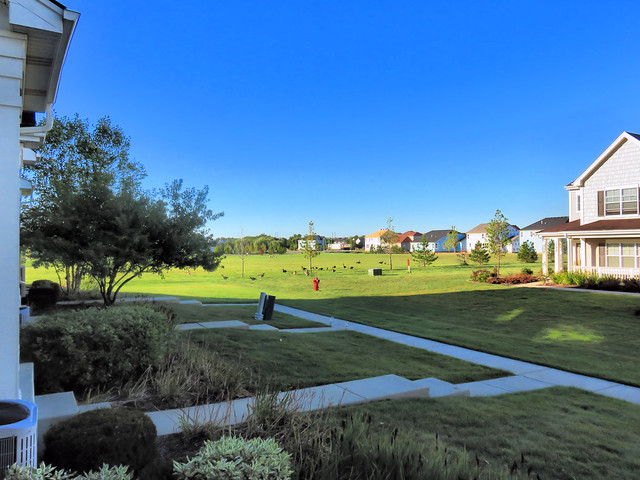
My telephoto lens provides a closer look at those Sandhill Cranes, a family unit, which will normally remain together through the fall migration. They usually lay two eggs, but in most cases only one (or neither) hatchling survives. The adults have bright red foreheads, lacking in the juvenile bird ("colt") to the left in this photo. The adults' plumage is stained brown by the minerals in the mud they use in preening, while that of the colt is mostly clean gray. It has been playfully chasing any Canada Goose which ventures close by.
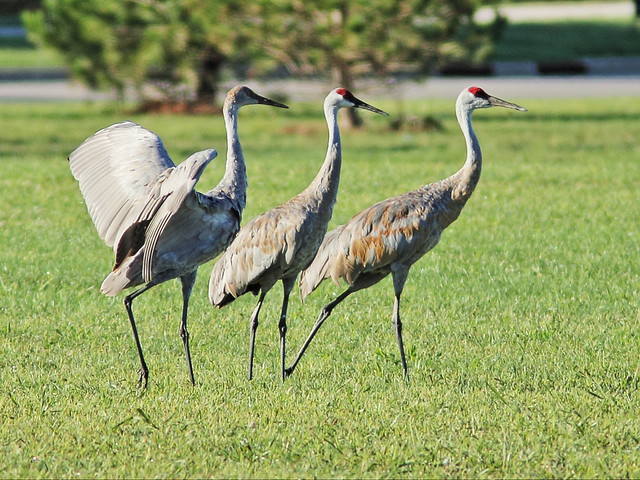
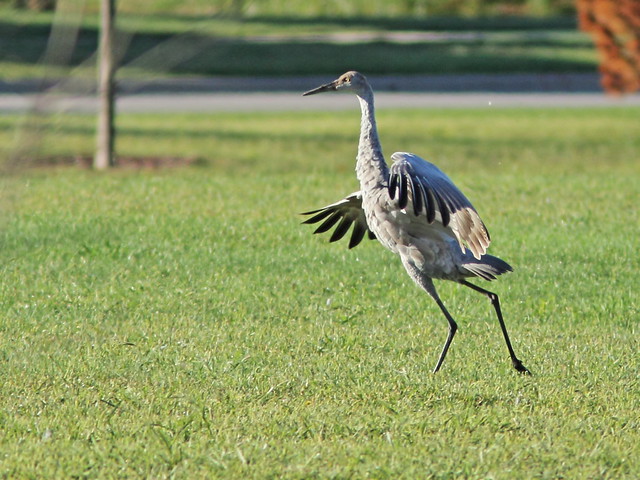
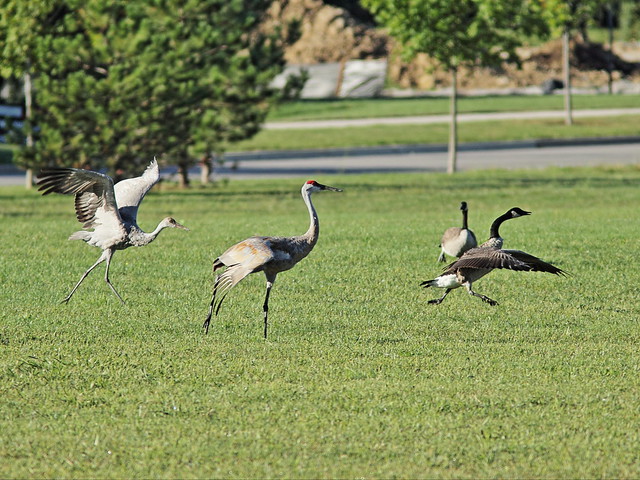
Presently there is a patch of relatively undisturbed open space only a few blocks away, at Jones Meadow Park. Here is a fence along the boundary of this small park, showing signs of age and weathering. It has provided perches for some memorable avian subjects,...
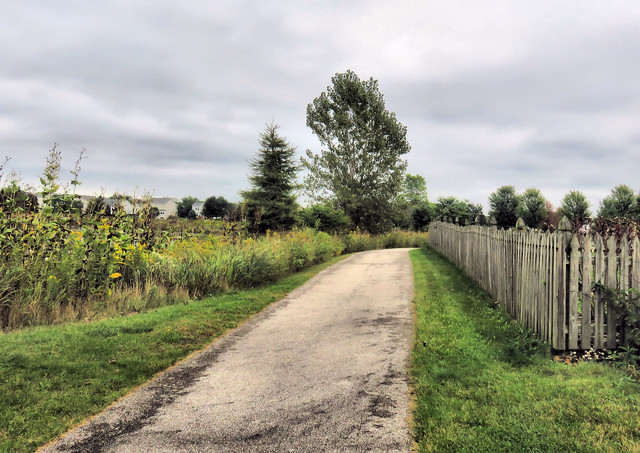
...among them, this Chipping Sparrow, when the posts were new, back in May of 2009:
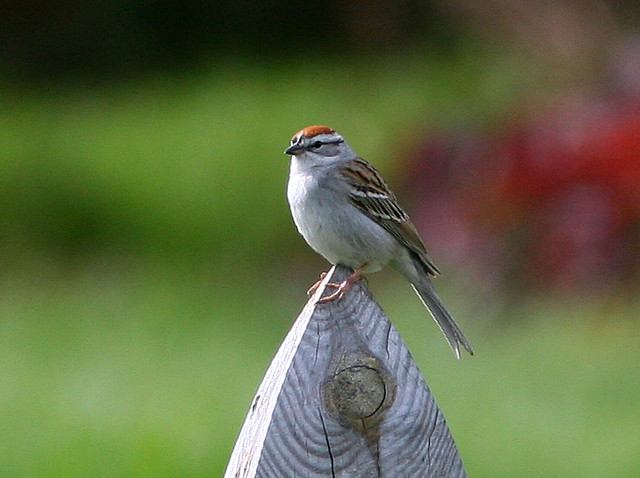
Brilliant red Cardinal Flowers, such as these next to a pond in nearby Lippold Park, are indeed shaped like birds. Their stamens look like heads with beaks, and each has two narrow wing-like sepals and a three-lobed sepal serves as a tail. One of the few truly bright red wildflowers, they add a splash of color to the fall landscape in wet areas, and attract migrating hummingbirds. To my eye, these flowers appear to be dancing gracefully in a circle:
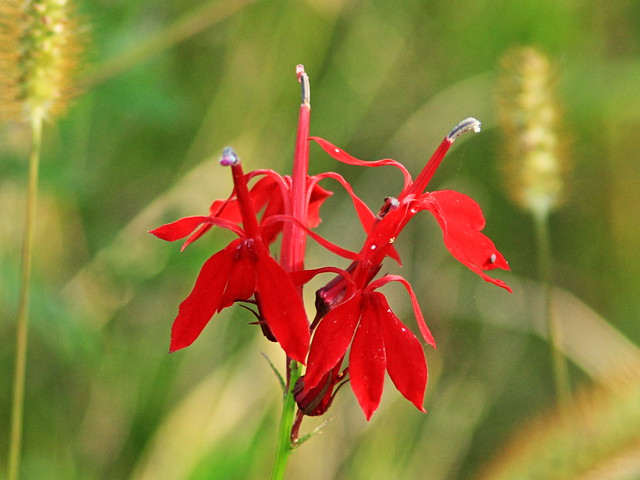
= = = = = = = = = = = = = = =
Linking to Misty's CAMERA CRITTERS,
Linking to Eileen's SATURDAY'S CRITTERS,
Linking to GOOD FENCES by Tex (Theresa).
Linking to WEEKEND REFLECTIONS by James
Linking to BirdD'Pot by Anni
Linking to Wild Bird Wednesday by Stewart
Linking to I Heart Macro by Laura
________________________________________________
Please visit the links to all these memes to see some excellent photos on display
________________________________________________
Amazing photos of the cranes. I hope they'll continue to visit you.
ReplyDeleteGood morning, I love the shots of the cranes and the cool looking storm capture. The sky looks amazing. Sorry about the development, just how much housing is really needed? Have a happy day!
ReplyDeletei'm glad there's a few areas of undisturbed earth and some parks for the birds that'll still come around.
ReplyDeleteMy the land certainly changed over time and with the development of the homes. - I'm sure it's sad that the wildlife has lost a lot of it's habitat but apparently those that remain have adapted. - I enjoyed seeing those Sandhill cranes and the sweet bird perched on the fence post. It looks like a lovely area to live.
ReplyDeleteGreat post, and really gets you thinking. We see this same development sequence over and over again all across the US. Where I live, there is pretty much zero undeveloped land. Truly wish we could achieve low or zero population growth and save what little undeveloped land still exists.
ReplyDeleteI almost laughed out loud at the photo of the young crane chasing he geese! That is hilarious. Amazing sky photos here...Just really enjoyed my visit.
ReplyDeleteI'm glad to see that the birds are being persistent and returning irregardless of the housing that has taken over their playground. The storm clouds are awesome, but scary!
ReplyDeleteSorry you've had to lose your prairies view.
ReplyDeleteNice that some of the birds are returning. Great shots of the cranes, and those clouds are fabulous!
ReplyDeleteThis is a good series, KCS. The same thing is happening at my sister's house: so much sprawl, every space is being taken for homes and condos.
ReplyDeleteI like the pictures you have taken over the years, especially that sandpiper close up.
~
Such an interesting post with good coverage and photos of the changes that have taken place around the condos. A small lake or even a pond would perhaps encourage more birds to return Your photos of the cranes that remain are great, and I particularly like your sparrow capture, and those stormy skies.
ReplyDeleteInteresting to see how the environment has changed over the years but you can still find wildlife if you're prepared to look closely.
ReplyDeleteAll very nice images, great shot of the storm!
ReplyDeleteMarvelous photography and information ~ Yes, 'change is the one constant' in life ~
ReplyDeleteHappy Weekend to you,
artmusedog and carol
Wow, very impressive and great photos.
ReplyDeleteHi Ken, just stopping back to say thank you for linking up and sharing your post. Have a happy weekend!
ReplyDeleteThose sandhill cranes are doing well to make the best of a closing environment. Love the cloud formation.
ReplyDeleteHere they are required to construct a low walled area, a sinkhole of kinds, so runoff water can be channeled there and increase the ground water. They probaby add some bird habitat too. It's sad they didn't allow some wild area for the animals and birds, but the birds seem to be able to cope. The colt is cute chasing the goose, it makes me think of my chickens chasing each other around.
ReplyDeleteInteresting and sad post - and I bet you the roads to the new building will be called things live "Valley Parade" or such like to give them a rural feel!
ReplyDeleteCheers - Stewart M -Melbourne
We're having the same thing happen all around us in most of the little fishing villages here. Photography of birds [and wildlife] from our past may be all we have left if this keeps up. It's a sad situation.
ReplyDeleteBeautiful birds. [there is nothing like hearing the sandhill cranes from a distance and then watch them flock into a field nearby] AND LOVE the sky images.
Before we leave for the day, I just wanted to stop by and say this:
Thank you for taking time to add your link this weekend at I'd Rather B Birdin'.
Great shots!
ReplyDeleteThank you for sharing all of these great shots here. Won't you please come link up at http://image-in-ing.blogspot.com/2015/09/shake-those-tail-feathers.html
Great post and beautiful photography.
ReplyDelete@Hannah--Yes, the area set aside as a "park" could just as well have been managed as a restored grassland. People would probably object to it as an eyesore. The little pond actually allowed a muskrat to build its home there. Just another "varmint."
ReplyDelete